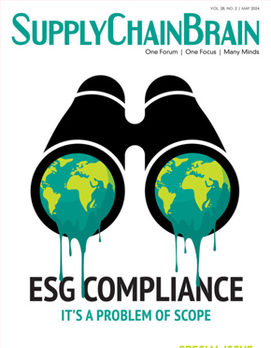
Various flavors of hosted applications - whether labeled the cloud, software as a service, or on-demand - have become ubiquitous in the world of information technology. Early versions of the concept extend as far back as the 1960s, but the singular milestone leading to today's cloud environment was probably the debut of Salesforce.com in 1999, providing customer-relationship management software from remote servers. Three years later came Amazon Web Services, Inc. (AWS), which has become the cash cow of otherwise margin-challenged Amazon.com. Now, you'd be hard-pressed to find a major I.T. application that doesn’t have a cloud-delivery option, and many reside solely in the cloud.
Over the years, bits and pieces of the supply chain have migrated to the cloud, but their overall progress has been relatively slow. “Traction in other areas has been unbelievable,” says Rick Jewell, senior vice president of application development with Oracle Corp. Less so with supply chain.
From Oracle’s standpoint, Jewell suggests that the delay was intentional. It was well aware of the trend, he says, “but we weren’t quite sure whether the world was ready for supply chain in the cloud.”
It is now, he says. A survey taken in 2015 found 80 percent of respondents either running applications in the cloud, or intending to do so within the next 12 months. Three years earlier, the same number expressed the opposite view. Says Jewell: “I believe we’re hitting it right at the right time.”
He attributes that initial reluctance to natural suspicions about new technology, especially when it comes to processes as critical as those related to the supply chain. Early adopters were more willing to move commodity-type applications to the cloud, such as human capital management and enterprise resource planning. They took longer to trust the cloud model for functions that deliver competitive advantage.
Initial concerns about the cloud centered on two main areas: security and continuity. In the case of the first, companies feared their proprietary information being exposed to the world, especially where outside servers were being shared by multiple users. That worry has dissipated with the maturing of cloud-security measures, coupled with the realization that hacking can occur just as easily with on-premise software. In fact, many of the most serious cyberattacks of recent years have been against companies that kept their I.T. applications in-house.
Concerns over service continuity have been validated by glitches over the years. As recently as September of 2015, AWS suffered an outage that interrupted service to customers of major streaming services such as Netflix, IMDb and Amazon’s own video and book sites. But such disruptions have been relatively rare of late, and they don’t seem to have prevented businesses from embracing the cloud model for even the most critical applications.
Today, claims Jewell, “continuity is not an issue at all.” Oracle, like other major software vendors, holds strict service-level agreements with customers, and measures itself against those documents. “We have not had any outages,” Jewell says, adding that Oracle maintains an Exalogic platform of hardware and software under every one of its cloud deployments.
Oracle has committed totally to the cloud, and Jewell expects its customers to follow suit. Eventually, he says, all of them will be relying on cloud-based supply-chain applications. “It’s a matter of how they’re going to get there.”
When it comes to supply-chain apps, Jewell says, companies fall into three categories: complementary, incremental and transformational. The first tend to be small entities taking a “rip-and-replace” approach to software implementation. The second prefer to phase in their applications, perhaps beginning with financials and ending with the order-to-cash cycle. The third, whose numbers remain relatively small, are out to transform their entire organizations through cloud-based applications.
Few, though, leap into the cloud all at once. Multinationals might choose to keep key applications on premise at larger manufacturing and corporate sites, while relying on the cloud at smaller, more remote locations that were previously relying on legacy systems. “Our big customers right now are [undergoing] two-tiered transformation,” Jewell says.
Smaller companies, such as those relying on Oracle’s JD Edwards EnterpriseOne line of ERP applications, are natural candidates for the cloud, Jewell believes. They might be transitioning from small legacy servers and prefer to look beyond the firewall for new apps. “The cloud is a no-brainer for [JD Edwards] users,” he says.
There will continue to be laggards who resist the lure of the cloud, especially in the realm of supply chain. But the future appears to be squarely in that area, with on-premise applications fading away as companies step up to new versions of software and look to harmonize their I.T. deployments across the organization. For now, says Jewell, “it’s the ones who believe that I.T. systems can be a competitive advantage that are now moving to the cloud.”







